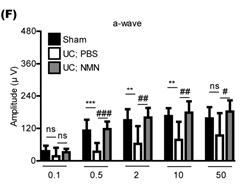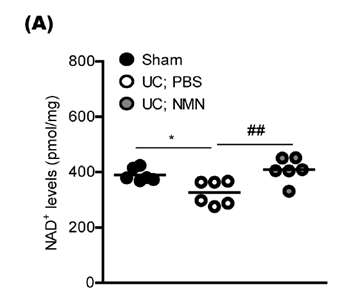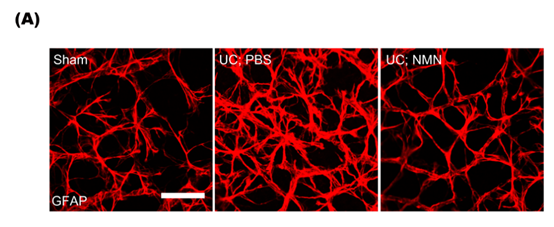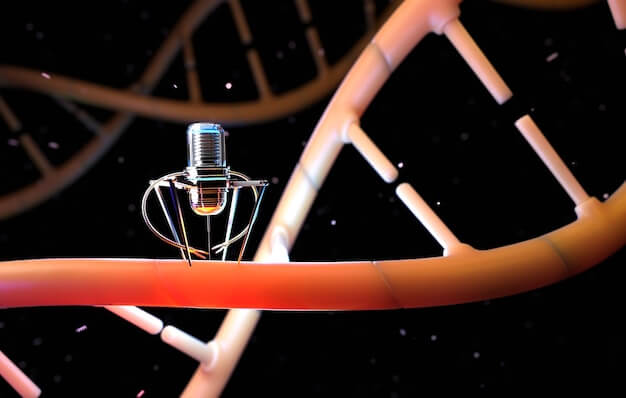Medical
Japanese Scientists Find That Nmn Supplementation May Treat Retinal Dysfunction Caused By Cardiovascular Disease
New research by japanese scientists has found that

As we age, we are more likely to suffer from retinal dysfunction, a complication of cardiovascular disease. The retina, the part of the eye responsible for receiving light signals, is susceptible to retinal dysfunction due to cardiovascular disease, such as carotid blockage.
Recently, scientists from the Laboratory of Photobiology, Keio University School of Medicine, Japan, published a paper in the International Journal of molecular science entitled "Nicotinamide Mononucleotide Protects against Retinal Dysfunction in a Murine Model of Carotid Artery Occlusion", which found that NMN elevates NAD+ levels in the retina, activates antioxidant genes, and reduces activation of glial cells (glial cells are central nervous system (CNS) immune cells). (CNS) immune cells that, when activated, promote inflammation and scarring).
I,NMN treatment reduces retinal dysfunction
The team first operated on adult male mice with carotid artery occlusion and administered 500 mg/kg/day of NMN, and found that NMN treatment significantly reduced the retinal dysfunction caused by carotid artery occlusion.
(NMN protects retinal function. Compared to healthy mice (black), carotid occlusion mice (white) were exposed to electric waves of increasingly bright light, resulting in retinal dysfunction. the NMN group (grey) protected retinal function.)
II, NMN elevates NAD+ levels and activates antioxidant genes
Cardiovascular dysfunction and vascular occlusion are often accompanied by oxidative stress - cellular stress caused by reactive oxygen molecules. NAD+ has been shown to help alleviate oxidative stress and supplementation with NMN has been shown to increase NAD+ levels. In this vein, Lee and colleagues examined NAD+ levels and oxidative stress in the retina. They found that NMN supplementation increased retinal NAD+ levels and activated the Nrf2 antioxidant gene. 
( NMN elevates retinal NAD+ levels)
III, NMN prevents pro-inflammatory activation of glial cells
Neuroglia are widely distributed in the central nervous system. In response to injury, glial cells are activated and help in recovery. However, activated cells can also cause inflammation and scar formation, thus preventing tissue regeneration in the injured area of the central nervous system. The study found that NMN supplementation reduced such scarring in the retina after occlusion surgery, as well as reducing signalling molecules from pro-inflammatory glial cells.
 The study by Lee and colleagues suggests a positive therapeutic effect of NMN on retinal injury, but given the differences between mice and humans, more research is needed before NMN becomes a viable treatment option for patients with retinal dysfunction due to injury or age.
The study by Lee and colleagues suggests a positive therapeutic effect of NMN on retinal injury, but given the differences between mice and humans, more research is needed before NMN becomes a viable treatment option for patients with retinal dysfunction due to injury or age.
-
![]()
![]() MedicalJul 21, 2025
MedicalJul 21, 2025New Developments In Gastric Cancer Research: Keytruda In Combination With Chemotherapy Significantly Improves Survival In Patients With Advanced Disease!
-
![]()
![]() MedicalJul 20, 2025
MedicalJul 20, 2025This is not science fiction! The robot successfully repaired the pig's damaged esophagus
-
![]()
![]() MedicalJul 19, 2025
MedicalJul 19, 2025Cabozantinib In Combination With Atelizumab Works Well For Advanced Head And Neck Cancer
-
![]()
![]() MedicalJul 18, 2025
MedicalJul 18, 2025Living cell anti-aging therapy is quietly emerging
-
![]()
![]() MedicalJul 17, 2025
MedicalJul 17, 2025New Research Shows Promise For Bone Marrow Transplant Recipient Patients To Reduce Treatment Side Effects!




